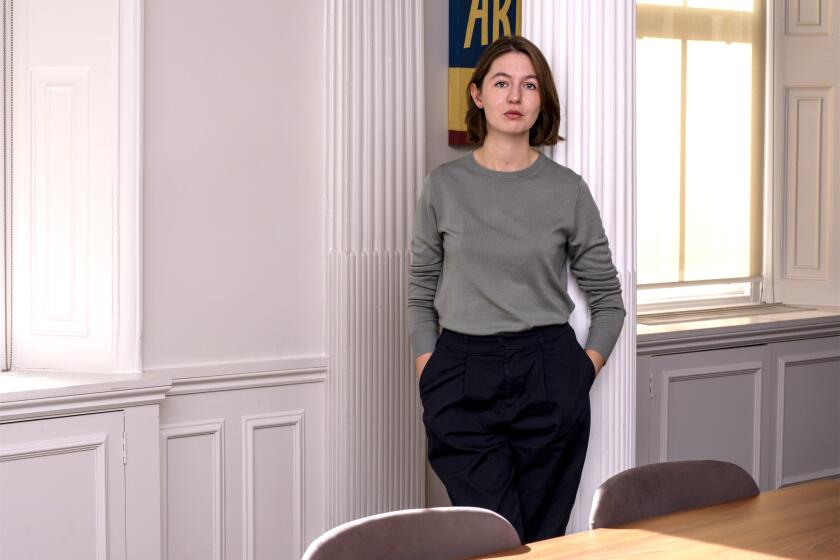Review: Millennial angst, vacuum-packed, in debut stories after Sally Rooney’s dark heart

On the Shelf
Reward System: Stories
By Jem Calder
FSG: 304 pages, $27
If you buy books linked on our site, The Times may earn a commission from Bookshop.org, whose fees support independent bookstores.
A male user swipes right. A woman is notified. There is a pause. How to respond? “Having waited a requisite number of hours after receiving the male user’s message so as to appear sufficiently busy and not desperately alone,” Jem Calder writes, “the female user pieced together a response to the male user that sounded both playful and hedging.”
Millennial malaise and self-awareness, the effort to fight through alienation despite the awful sense that nothing is natural or right: This is the taut, weird, irresistible new terrain — as evidenced by the above, from a story called “Distraction From Sadness Is Not the Same Thing as Happiness” — that helps make up Calder’s brilliant, compelling and defiantly authentic new collection of stories, “Reward System.”
Throughout these half-dozen stories, the young British debut author masters a kind of maximal minimalism, piling on details and allusions while stripping away illusions. Imagine a slightly less coy Sally Rooney paired with a highly perceptive alien, with strangely illuminating results. Again and again, Calder reminds us of Rooney (who blurbed the book) while moving the conversation forward — into realms that feel simultaneously darker and (in tiny, essential ways) more hopeful.
Consider the collection’s nearly novella-length opening piece, “A Restaurant Somewhere Else,” probably the most lush and personable of the bunch, following as it does Julia, a young, odd cook who is replacing Lena as a new chef at a well-reviewed restaurant in London. We get to know Julia’s passive-aggressive mother, the mess her friends are in, her awful roommate and Ellery, the charming new boyfriend, who is also the head chef.
Rooney’s ballyhooed third novel, “Beautiful World, Where Are You,” has it out over whether Sally Rooney deserves to write bestselling fiction.
Problems mount. Does Julia actually enjoy sleeping and working with her boss? Will her roommate ever shut up so they can enjoy the meal she’s made? Why is Lena trying to reach out to her on Facebook with a stern warning that will change everything?
Anyone who’s recently become obsessed with “The Bear” knows how fun it is to eavesdrop on a restaurant kitchen. Calder’s writing carries a similar confidence in driving home the rules and customs of this universe, beginning with a list of imperatives: “‘Mind your elbows.’ ‘Cut against the grain.’ ‘Sumac lives in the storeroom, not on the sideboard.’ ‘Next time, bring your own knife roll.’” That staccato brio echoes through the mini-chapter subtitles of the story: “The Apartment,” “The Nightcap,” “Size Eight.”

But there’s more at stake here than foodie voyeurism. Characters appear and reappear throughout the stories — Julia, Nick, Teddy, Roos — the whole gang gesturing toward a sort of wholesale set of ideas about who we are and who we want to be. Be warned: It can feel bleak. These young people have terrible jobs. They meet new people primarily via apps. Their parents aren’t getting any easier to comprehend or communicate with. The rich are getting richer. What’s next for them? For us? For the planet?
Calder has certainly read his Economist, Guardian and Financial Times; he savvily marshals buzzy facts and newsy concepts in service of an atmosphere rich with the irony (and pollutants) of modern living. Julia, for instance, would “step outside to breathe deeply the cool, low-quality city air contaminated by microplastics, lead particulate, nitrogen and sulphur dioxides; the grey, early-evening sky above her gleaming or else just appearing to gleam like one endless, sterile, epoxy-resin kitchen floor.”
A bit later, Ellery opens an old wine bottle that is never just a wine bottle. “Remember,” he tells Julia, “You’re drinking thirty years of history here.” Which Calder uses to blow our minds, the next sip encompassing “multiple wars; economic recessions; iconic acts of terror; the rise of consumer electronics; Catholic school; kids are cruel; Accutane; learning to drive; meals every day; global ecological degradation; crying in the rain.” These kinds of lists are not merely clever; their cumulative impact is stirring — and then devastating.
An Irish millennial’s first novel, “Exciting Times,” pins the touchstone generational tension between sardonicism and sincerity.
So what do these self-aware and sodden victims of late capitalism imagine might feel, well, rewarding? Calder playfully and wickedly reduces the online dating conversational system to “the standard big-three Wikipedia-entry subhead topics of early life, career and personal life.” On the aforementioned female user’s second date, the couple spent “six minutes engaged in eye contact; consumed five rounds of drinks; encountered more than three hundred ambient, native and over advertisements combined; were proximal to fourteen persons suffering chronic pain, eleven Christs in statuary.” Not good. But inescapable?
Maybe the most promising preview of Calder’s next book, which I’d venture will be a breakthrough novel — his easy admixture of research, lacerating wit and social criticism presaging a career equal to Rooney’s — is a second nearly novella-length story, “Search Engine Optimization,” which is as deeply funny as it is engrossing.
Nick, maybe the best guy in the book, is at work at an awful marketing firm. He forces his eyes to “scan another sentence left to right, releasing a small mammalian whimper as he does so — every additional word he reads extracts something vital from him.” Why? “The bureaucratic business model of the creative industry is to strategically over-allocate professional resources; the opposite of labour-saving. The more billable time you can expend on a project, the more money the company can justifiably charge to its client. The best work ethic you can have around here is a bad one.”
Nick is dutifully squandering company time, albeit in a higher pursuit — struggling to write a short story. Around him unfolds the dull and hopeless work of a cubicle maze that forces otherwise potentially lovable people to live lives of unquiet desperation. The son of one of the founders is a creep, doing things during meetings that a secretive IT guy is furtively watching. Another worker is “one of those people who’s so normal she kind of seems insane.” Confrontations brew.
You might be wondering: How urgently do I need to read an ominous series of premium short stories set in and around London about very internet young adults whose sole hope seems to lie in writing stories? Well, another idea of a good alternative materializes when Julia plots her escape from the straitjacket of the U.K. and her mother and that creep Ellery. Our appealing female lead is apparently headed for the New World — specifically, Toronto.
In Anna Dorn’s novel ‘Exalted,’ an astrology blogger and a troubled woman meet not-so-cute and wreak havoc while avoiding some very real issues.
Deuel is the author of “Friday Was the Bomb: Five Years in the Middle East.”
More to Read
Updates
12:48 p.m. July 22, 2022: This review has been updated to reflect a change in the character Julia’s destination city that was made between the distribution of advance review copies and the publication of the book.
Sign up for our Book Club newsletter
Get the latest news, events and more from the Los Angeles Times Book Club, and help us get L.A. reading and talking.
You may occasionally receive promotional content from the Los Angeles Times.








